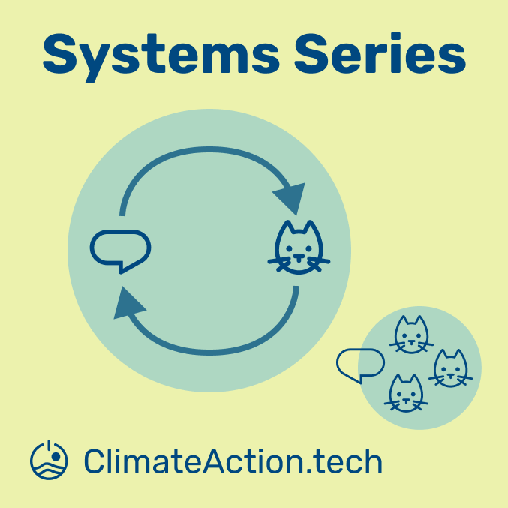From 22nd May, we’re starting a co-creation series called Systems Change for Sustainable Tech. Together, we will envision a sustainable future for technology, map our current situation using systems maps (causal loop diagrams), identify key leverage points for impactful change, design effective interventions, and create action plans to bridge the gap between our vision and today’s reality. This series is designed and facilitated by Siddhesh Wagle and Jon Sleeper, and is open to all members and non-members of the CAT community.
About the series
The series will be structured as an online discussion based workshop on the Miro board digital dashboard. This platform will allow everyone to actively collaborate and contribute their ideas using sticky notes.
Initially, the series will consist of three parts focused on developing a shared vision and exploring how systems thinking can help us achieve it. Following these initial sessions, the Miro board will remain active and available for future workshops or brainstorming sessions. We can then leverage systems thinking to address wicked problems (the complex problems we face that lack straightforward solutions due to their interconnected nature).
Who should join?
This workshop is for anyone involved in building or using technology who is passionate about creating a sustainable future for the field. In an era where technology affects everyone, directly or indirectly, it’s crucial that a wide range of voices are included in shaping this vision.
While the series is open to everyone, we encourage you to join the ClimateAction.tech community. This will allow you to participate in ongoing discussions and collaborate with others who are dedicated to improving technology in all aspects. As a member, you’ll also have access to our Slack channel and valuable resources.
How to participate?
The series will commence on May 22nd, 2025. I encourage you to join from the beginning, where we will start by envisioning a moral and sustainable tech future. To participate, please RSVP to the event. If you are not already a member of ClimateAction.tech, please consider joining our Slack channel for regular updates and to connect with the community in building ethical and sustainable technology.
I look forward to embarking on this co-creation journey with you.
Why focus on systems change?
The overwhelming nature of our unsustainable world can make it difficult to imagine a different future. However, envisioning a just and sustainable world, especially alongside others who share this concern, empowers us to believe in its possibility and to develop the necessary strategies and models to achieve it.
Mapping our current reality after establishing a desired future is crucial to understanding the distance between the two. Systems thinking provides us with valuable tools to map the various factors and their interconnectedness that have led to our present circumstances. This process allows us to pinpoint areas within the system where targeted interventions can have the greatest impact.
Given the urgency of the climate crisis, it’s essential that the technology sector does not contribute further to the problem. The entire lifecycle of technology, from the extraction of raw materials for our devices to the disposal of e-waste, has a significant environmental footprint.
While individual efforts to reduce the carbon footprint of our work, such as designing more efficient websites or green software, are important, adopting a systemic perspective on technology is equally vital. This broader view allows us to recognize the complex web of economic, social, technical, ethical, and environmental factors that contribute to various practices in the tech industry.
Therefore, establishing a clear vision for sustainable technology and thoroughly mapping our current reality are necessary first steps. By acknowledging the tension between these two states, we can then take meaningful action to close the gap while staying true to our sustainability goals.
In these critical times, this creative tension will drive us forward toward our vision of sustainability and motivate meaningful climate action.
Collaboratively building a future for sustainable technology can be a truly empowering experience. By mapping our current challenges together, we can leverage our diverse skills and knowledge to gain a clearer understanding of the unsustainable aspects of technology. Furthermore, designing interventions as a group instills a sense of active hope.
This series aims to help us grasp the full scope of the sustainability challenges within the tech industry, which can often feel overwhelming for an individual to tackle alone.
About me
I am the founder of SystemsTree, the vision of which is to create a sustainable world by applying systems thinking to create sustainable tech. I see this series as a vital systems change project aimed at making technology truly sustainable. My passion for this work stems from the opportunity to apply my understanding of Systems Thinking to the field of technology and to engage in deeper conversations about both the sustainability and ethics of tech.
For years, I’ve used poetry as a way to understand and process the realities of climate change, exploring our emotional responses to the unfolding crisis. More recently, I’ve incorporated visioning exercises to imagine the future I hope to see. This practice has been personally healing and has empowered me to take action towards realizing a sustainable future. Facilitating shared vision workshops allows me to bring people together to collectively imagine this future.
I am enthusiastic about facilitating systems change initiatives that prioritize sustainability. This series is one such effort to connect individuals from the Climate Action Tech community and anyone who feels a strong sense of responsibility towards designing and using sustainable technology.
References
While not required reading for the series, you may find the following books helpful for understanding Systems Thinking:
- Thinking in Systems by Donella Meadows
- The Fifth Discipline by Peter Senge
- Systems Thinking for Social Change by David Peter Stroh
